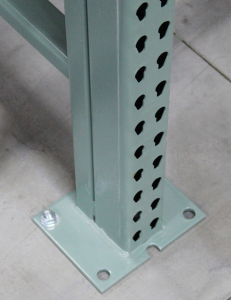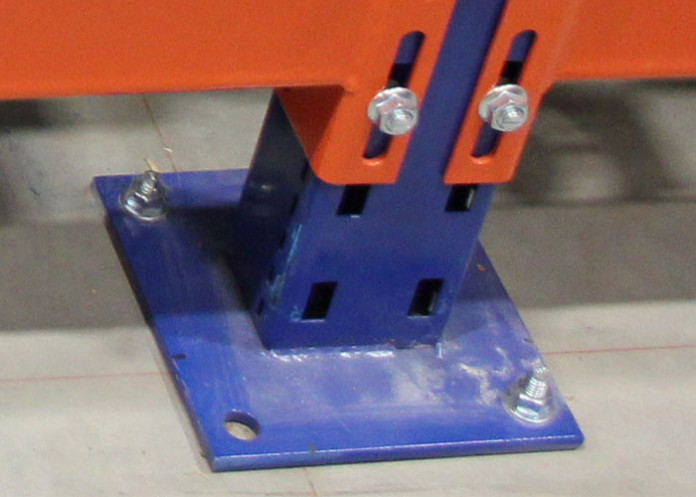Why upgrade from the Standard Baseplate?

Most rack companies offer a very small and thin baseplate (1/8” x 3” x 5”) as their standard baseplate with standard pallet racking components. This is what you may get for your frame if you are in a low seismic risk area where a larger baseplate is not needed for seismic resistance and there is no request made for a more substantial baseplate. The purpose of this blog post is to outline the importance of the baseplate and to help the rack user understand that it may be a wise decision to consider an upgrade from the standard simple baseplate, even in low seismic applications.
The baseplate is important because:
- It distributes the column load to the floor slab. The larger and thicker the baseplate is, the less stress (PSI) is exerted on the slab.
- It provides rotational restraint at the base of the column. Added rotational restraint at the base can significantly increase the actual capacity of the frame from the “pinned base” condition.
- It transfers any uplift force that may exist (from seismic or other overturning effects) to the anchor bolts.
- In the event of a fork-lift impact, it transfers the load from the column to the anchors and works to keep the column in its position, rather than being displaced. A second anchor in the aisle side column can also be beneficial to prevent the column from “spinning” if impacted.
- It helps to prevent a collapse from progressing to the whole row if there is an incident where a fork-truck takes out a column.
An upgraded baseplate will result in improvement in all items, one through five above. The main argument against a heavier baseplate is cost, but when the total frame weight and cost are considered, the percent change by a baseplate upgrade is really surprisingly minimal. A standard 1/8” x 3” x 5” baseplate may weigh 0.6# as compared to a 3/8” x 5” x 7” baseplate weight of 3.7#, so upgrading to the 3/8” baseplate only adds 6.2# to the frame weight. If the frame weighs 200#, the difference is about 3% of the frame weight and an even lower percentage of the total project cost. Many rack users later regret not selecting this small upgrade to their rack purchase.
